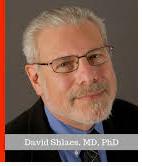Dr. David Shlaes has written numerous times on "pull incentives" to encourage new antibiotic discovery, and why professional societies (like the Infectious Diseases Society of America and the AMA) aren't providing enough input to emphasize the importance of emerging bacterial resistance. Today our ACSH advisor expands on both topics.

I have written two blogs relevant to today’s discussion. In one, I decry the absence of guidelines from professional societies, especially the Infectious Diseases Society of America. In another, I note that all of us desperate for significant "pull incentives" spend most of our efforts in this regard talking among ourselves. Today, I want to expand on both those topics.
We always say, accurately, that without effective antibiotics, medical care, from the mundane to the complicated, would be rendered much more difficult with consequent increases in morbidity and mortality. If that is true, and I think it clearly is, where are all the professional societies that might be weighing in here? Is anyone home? To examine this, I first sent an email to IDSA asking if they partnered with other professional societies in this regard. I have had no response in almost two weeks. In the absence of their response, I investigated the websites of several other professional societies whose members might be impacted by our inadequate antibiotic pipeline. I first looked at the American Medical Association which boasts over 217,000 members. They have an active legislative advocacy effort. Antibiotic resistance is not among their top 20 priorities, although they do address the problem of resistance mainly through advocacy of stewardship efforts. They have made a recent statement supporting a multi-pronged approach that includes incentives for antibiotic R&D. But this is far from a concerted effort on their part. Next, I looked at the Surgical Infection Society, where I could find no information at all on a stance regarding our antibiotic pipeline or on legislation that might help in this regard. The American Society of Transplantation’s website is woefully out of date with a single statement from 2015 supporting the passage of the now-defunct PATH Act. The American Thoracic Society, that promulgates clinical guidelines frequently associated with the IDSA, maintains an up-to-date website that focuses on TB, tobacco, pollution and other important topics. But I was unable to find information on their efforts, if they exist, to prop up our antibiotic R&D effort.
Our statement - without effective antibiotics, medical care, from the mundane to the complicated, would be rendered much more difficult with consequent increases in morbidity and mortality – based on the websites I examined - seems not to resonate with physicians in general, not with surgeons, not even with transplant physicians who might be among those most affected by continuing emergence of resistance. What gives? I view this as a complete failure on our part to communicate the importance of this problem and to help those outside our echo chamber to understand the implications it could have for their daily practice of medicine. I also see this as a basic failure of our own professional society, the IDSA, to enroll the help of larger groups of physicians, especially those represented by the AMA, in our efforts to convince legislators of the importance of support for our lagging pipeline of new antibiotics.
I firmly believe that it would not be difficult to convince these groups, especially surgical infection specialists, transplant physicians, intensivists, pulmonary physicians and others to join with us in a multi-pronged approach to assure our ability to provide the kind of care we desire for our patients of the future. There are already multiple interactions between IDSA and its members and the pulmonologists, surgical infection specialists and transplant physicians. We just need to take advantage of these interactions to foster collaboration in our legislative efforts.
If we can’t convince our physician colleagues, how can we ever hope to convince legislators that we have a real problem here?
#Originally posted in Dr. Shlaes' blog Reprinted with permission.
Category



